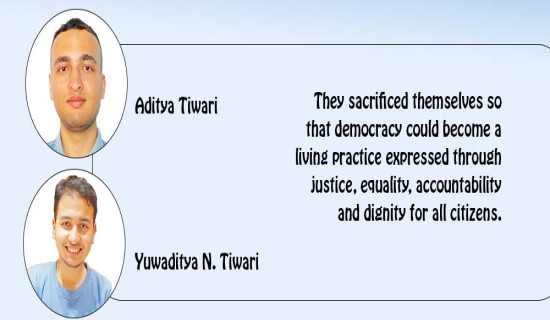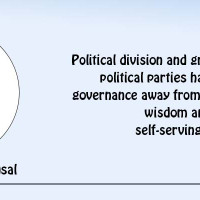- Friday, 30 January 2026
Quality Education Key To Development
Yug Bahadur
As healthcare is crucial for any person or his or her family members, access to good education is equally important for them. So it was good to read in TRN’s news report titled ‘Education key to build equitable society, says PM’. In the report, Prime Minister Pushpa Kamal Dahal Prachanda has been quoted as saying the foundation for development and prosperity can be laid only through proper investment in the education sector. Education is the basis of building an equitable society and he also said that founding of socialism cannot be laid without giving priority to education and only the quality of education can lay the foundation for good governance, civilisation culture and development.
We observe the National Education Day with much fanfare each year, but that’s about it. There are still areas around the country where children have to walk for hours to get to school. There are also schools which do not have proper housing and many a times children have to take classes in open fields. Then there is a lack of trained teachers and sometimes no teachers at all. Lack of textbooks is a common thing. It is under such conditions that our children have to try and get education.
‘Showpiece fees’
Of course, there are expensive private schools in the urban areas of the country, but they can’t also boast much except for the steep fees they charge to the students. Many individuals have turned school education and even specialised education as a money earning business. That is alright in a free market economy, but the students must not be cheated. Furthermore, we should not have schools only with foreign sounding names, there should be real good education, too. Almost everything is charged for in these private schools from ties to badges and what not, even library fees, electricity fees and sundry things are charged for. So, the actual academic fees are only a ‘show piece’.
Most developed countries have free education in public schools at least till high school. This includes America and they do not have dresses or other things for which a student may have to pay for. Instead, parents are prosecuted if they do not send their wards to school, not that is a really socialist foundation as mentioned by PM Prachanda. People from many poor countries, including Nepal, go abroad to study spending millions of rupees every year. But sadly, few come back to their birthplace, at least when they are young, energetic and productive and eventually the country becomes the loser.
Add to the many woes of the education system is also the politicisation of this sector. There was a time when the political parties had no leeway except to resort to using colleges and students to initiate any uprising or protests. But those days of restrictions are gone now, but we still see academic institutions being used for political purposes. This is alright as the right to protest is a fundamental right as guaranteed by the constitution, but while in the short-term some demands may be met, in the long term, demands difficult to be met in an impoverished country like Nepal, will set up a wrong trend with offices of colleges and even universities being locked up constantly. If this happens, how can work take place?
Not that the colleges and the universities, including the oldest and biggest university, the Tribhuvan University, are not at fault, too. They too have made many mistakes and teachers are not loyal to the institution they belong to. So the colleges don’t hold regular classes, teachers tend to teach in private colleges than being present for their work in the colleges they belong to, lack of a proper academic calendar and delay in issuing results of exams, among other things, are just some of the faults made by them and dragging them down.
And that completely upsets a young student’s future career. Even the life of a youngster can be completely changed, most of the times for worse, because of the carelessness of the teachers, colleges and universities.
But like mentioned education is very important and most times it should start right from the time before a child goes to school. This does not mean formal education, just good manners, respecting your parents – they are your all the first teachers after all of any child – doing small errands within the house, maintaining hygiene and staying clean are things which can instil discipline and help forward in the course of life of a person in the long run. Of course, good schools are needed after this. And in this aspect, the parents should learn that all children, no matter what the gender, must attend school for formal learning and a good future.
Teaching facilities
The first thing needed is naturally a school. Maybe every village cannot have a school, but surely one school can be built within a certain distance so that young students with heavy textbooks do not have to trundle across difficult terrains on a daily basis. Apart from schools, good teachers are also needed. They must have proper training, be qualified themselves and participate in refreshers training so that they are up to date and they can teach the students with the latest gadgets that are so easily available these days due to the swift growing technology for teaching facilities.
Teachers in remote areas should also get better pay and perks so that more qualified persons will join this profession. Yes, we want to set bigger airports, rails crisscrossing the nation, smooth and scientific roads, medium level ships floating on our rivers for various purposes, but we need better education first, as any other nation, the foundation for all round growth and ‘building of an equitable society’ lies in access to better education.
(Yug Bahadur is a freelance author.)

















